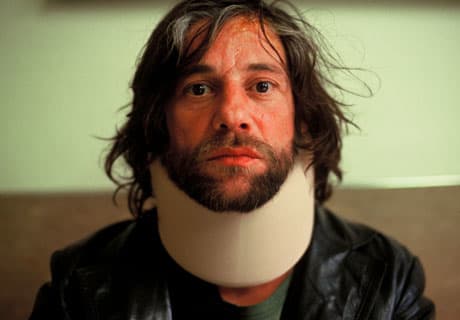If everything you know about the Turkish in Germany you learned from Fassbinder, Head-On will come as a shock - even that unsentimental director looks like a creampuff next to the goings-on in this doomed romance.
Our hero is the 40-year-old Cahit, a Turkish/German self-destructive enough to drive his car into a wall; his life turns around - sort of - when he meets the young and sexy Sibel on the inside of the hospital. Sibel, unfortunately, has an insanely traditional Turkish family (and the broken nose from her brother to prove it), prompting her to ask Cahit for a marriage of convenience, which he provides, with some confusion.
As he presides over her wantonness while secretly falling in love with her, the film moves towards a tragic event with the bluntness of a baseball bat and the precision of a surgeon. Every single blow hits its target for a maximum of pain. Without explanatory monologues or a "release of tension," it charts the progress of two people caught between two cultures that pay the ultimate price when the people surrounding that particular marriage of convenience fail to cooperate in the worst ways imaginable.
I can't remember the last movie that put me through so much baroque anguish without being completely exploitative (or completely phoney). This movie feels felt from the inside out, loves its battered couple and refuses to explain like a social worker what is all too painfully obvious.
Not since the death of Alan Clarke has such an affirmatively scabrous vision hit the screen, one that takes a stand for its hapless victims instead of quietly noting their suffering, and if it doesn't make my ten-best list this year, I'll be just as surprised as you. (Mongrel Media)
Our hero is the 40-year-old Cahit, a Turkish/German self-destructive enough to drive his car into a wall; his life turns around - sort of - when he meets the young and sexy Sibel on the inside of the hospital. Sibel, unfortunately, has an insanely traditional Turkish family (and the broken nose from her brother to prove it), prompting her to ask Cahit for a marriage of convenience, which he provides, with some confusion.
As he presides over her wantonness while secretly falling in love with her, the film moves towards a tragic event with the bluntness of a baseball bat and the precision of a surgeon. Every single blow hits its target for a maximum of pain. Without explanatory monologues or a "release of tension," it charts the progress of two people caught between two cultures that pay the ultimate price when the people surrounding that particular marriage of convenience fail to cooperate in the worst ways imaginable.
I can't remember the last movie that put me through so much baroque anguish without being completely exploitative (or completely phoney). This movie feels felt from the inside out, loves its battered couple and refuses to explain like a social worker what is all too painfully obvious.
Not since the death of Alan Clarke has such an affirmatively scabrous vision hit the screen, one that takes a stand for its hapless victims instead of quietly noting their suffering, and if it doesn't make my ten-best list this year, I'll be just as surprised as you. (Mongrel Media)
